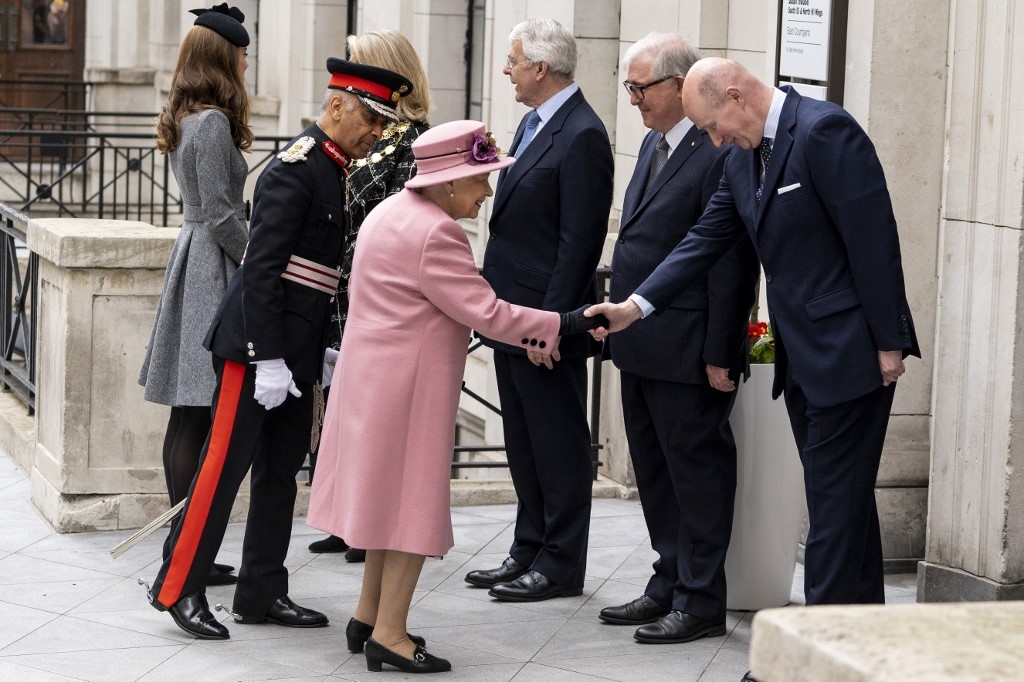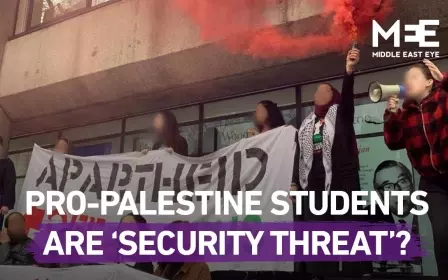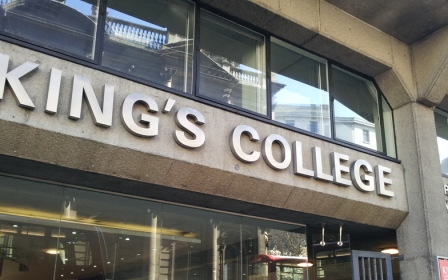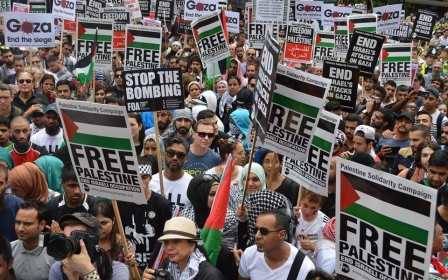London university sent dossier on student activists to police before royal visit

Students at one of the UK’s leading universities have called on the school to divest from investments which violate the rights of Palestinians, after it was forced to apologise to them for handing their names to the police and blocking a number of students from entering university premises.
King’s College London (KCL) said that it had taken actions against students that were “wrong and did not meet our values” after it admitted that staff had created blacklists of pro-Palestine and other student activists using photos and CCTV footage.
Students told Middle East Eye in March that college officials had admitted compiling lists of activists amid protests after several students had complained that they had been denied access to King’s premises during a visit by the Queen to the main campus building.
That was confirmed in an independent report commissioned by the university into the matter, which was published by the university on Thursday.
It found that some of those whose electronic entry cards were blocked had been due to sit exams on the same day and had also been barred from library and residential buildings away from the main campus.
Medical student Asif, a member of the Palestine Action Society who declined to give his full name, told MEE at the time that it was “very, very distressing” after he was denied access to the university's Denmark Hill campus, some six kilometres away from the main campus, where he was due to sit an exam.
‘Our suspicions were confirmed’
Speaking to MEE on Friday, Asif said: “Our suspicions were confirmed. We now want to see changes on campus.
“I’m personally very much in support of the desecuritisation of campus. Our uni has a lot more security than other universities in London. They can block us from coming to campus. They can herd us around like cattle rather than allow us to move around freely.”
Asif said that protesters on campus were seen as “dangerous people”.
“If you’re active around Palestinian issues you’re treated with suspicion.”
The entry cards of 12 other students were blocked on the day of the royal visit, preventing them from accessing campus buildings, according to the inquiry.
It found that university staff had “overstepped their authority” with Professor Evelyn Welch, KCL’s acting principal, in a letter to staff and students apologising “wholeheartedly”.
“We accept its findings and recommendations in full and are putting in place a plan to address all the issues that have been raised,” Welch said.
In a statement released on Friday, the students affected said the report was “a damning account of institutional incompetence and wrongdoing” but said “legally and morally, these events demonstrate that KCL management is not able to run a university”.
The students, drawn from Action Palestine Society, Climate Strike and other political student societies, called on KCL to support the Boycott Divestment and Sanctions movement and become “BDS compliant”.
“We demand that KCL make an immediate commitment to rooting out institutional complicity with violations of Palestinian human rights, including an immediate withdrawal of investments, partnerships, and links with companies or establishments which have been found to contradict KCL’s supposed values of making the world a better place.”
‘Desecuritisation’ of campus
They also demanded the “desecuritisation” of the university.
“This includes bringing all security staff in-house (alongside all other staff), removing all card barriers on campuses, dismantling and rejecting every semblance of the Prevent programme in KCL and initiating a staff/student-led review to further desecuritise KCL.”
The students also included members of the Justice for Cleaners campaign, a fair-wage campaign for university cleaners, who called on the university to “bring power to the workers and students” and demanded personal compensation.
The debacle represents the latest run-in between pro-Palestinian students and King’s College, a university that is often perceived to take a hard line when it comes to containing some forms of student activism.
A list of student protesters was first compiled after student protests erupted on 4 March against a visit to the university by Eli Bar-on, a former senior member of the Israeli army.
The university had already stepped in to change the venue and limit entry to members of the Israeli Speaker Society, which was hosting the event, after they raised concerns about protests taking place during the talk.
After raising safety concerns to senior university management the day after, KCL’s head of security, who has since left his job, was asked by the university’s deputy vice president of strategy to “please package up the identity of individuals” so that a disciplinary process could be started.
Days later the head of security sent senior staff a dossier of 16 students and one staff member, identified using CCTV footage and photos and including their course details and society membership.
No data protection assessment was carried out, the report said.
Emails show that on 15 March, Richard Kent, the assistant director of campus operations, wrote to the royalty protection unit at the Metropolitan Police to inform them that “we are picking up some unconfirmed reporting that some of our disgruntled students may try some noisy protest” on the day of the Queen’s visit.
After a meeting to discuss how to disrupt potential protests, Kent moots the idea of disabling student IDs with Tessa Harrison, director of students and education.
“I am sorry but I can’t support this. The rationale set out below could be potentially viewed as discriminatory and it feels very underhand to disable the cards,” she replied by email.
Dossier sent to police
On 18 March, the day before the royal visit, the police replied to Kent asking for the names and other details of the students.
Kent replied less than half an hour later, sending the dossier.
“See attached sheets of our main protesters who move between groups and topics depending on their moods,” he writes.
In another email, Kent appears reluctant to meet a police request asking for the date of births and social media accounts of the students because it might “raise flags”.
Yet he goes on to list a number of student societies, including KCL Action Palestine, KCL Climate Strike and KCL Intersectional Feminists.
The 18 March was also the start of Israel Apartheid Week, a week of activists action at universities across the UK in support of the BDS movement.
In the evening, student protesters disrupted a meeting of the college council, the university’s highest decision-making body, unfurling a banner and delivering an open letter demanding the severing of ties with Techion, an Israeli research institute with links to the arms trade.
Just after 6am on 19 March, the same member of the Metropolitan Police phoned the head of security to say that he’s learnt about the disruption to the council meeting.
He then submits a formal request by email asking security to bar students from parts of KCL’s new Bush House premises in central London, which the Queen was due to open.
“Would I be able to have a reassurance that none of the identified individuals from the groups identified and sent to me will be allowed access to the auditorium, 8th floor, 4th floor and entry and exit level as well as the East courtyard, during the event,” the officer writes.
Kent repeated his request to block student IDs in an email to director of students and education, Tessa Harrison. The Queen was supposed to arrive in a matter of hours.
She was still resistant but complies: “This remains problematic for us as already mentioned but given the instruction I guess we have no choice.”
While university security staff had planned to block the selected students from access to Bush House alone, the report notes that this “was not technically possible... so the particular students’ card were simply locked entirely, hence blocking them from all King’s campus buildings.”
According to data provided in the report, the student IDs of most of the 13 student activists were switched off between 8.30 to 2pm, preventing them from entering the library, the student’s union and a halls of residence, despite multiple attempts.
‘Lukewarm response’
While King’s said it accepted the report’s conclusions and would work more closely with the university’s student union, another student affected said she had “no faith” that the recommendations in the review would be carried out.
“The lukewarm response from KCL to the report, with mediocre apologies and no commitment to change, confirms that this is an institutional problem that management will do everything to not address properly,” said Riobhca, who was identified only by her first name, in the student statement.
Students also pointed out that the report failed to address what they said was “racial and political profiling”.
“Emails between management clearly show targeting of specific campaigns, including KCL Action Palestine and Justice for Cleaners. The events occurred during Israeli Apartheid Week, and those banned were banned for their activism in a demonstration against an Israeli colonel the week before. Almost all those banned were people of colour. This must not be ignored,” they said in the statement.
In her letter on Thursday, Evelyn Welch, KCL’s acting principal, denied this.
“While the report does not suggest it, we accept that some interpreted the actions that were taken on the day as racial profiling. This was not the case and I want to reiterate that discrimination on any grounds is unacceptable and is damaging to our community,” she said.
Middle East Eye delivers independent and unrivalled coverage and analysis of the Middle East, North Africa and beyond. To learn more about republishing this content and the associated fees, please fill out this form. More about MEE can be found here.





